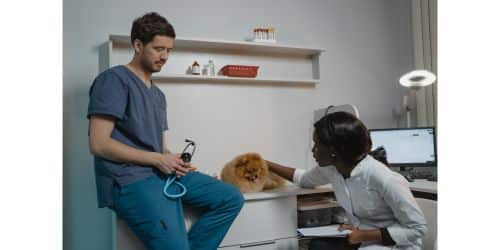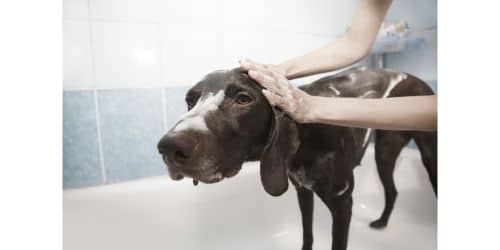It’s thrilling to welcome a new furry friend into your home, but it also comes with responsibilities, such as proper flea treatment and prevention. Fleas can be annoying and dangerous to young puppies’ health. However, it’s essential to approach flea treatment for puppies under 12 weeks with caution, as their delicate systems require extra care. In this comprehensive guide, we will look at safe and effective flea treatment alternatives, natural cures, preventative techniques, and professional advice to protect your canine companion’s health.
Understanding the Risks of Fleas for Puppies
Fleas are not only annoying, but they can also cause serious health problems in pups. These small, blood-sucking parasites can cause itching, skin irritations, allergic reactions, and even disease transmission. Puppies are especially prone to the negative effects of fleas due to their young age, making it critical to manage the issue quickly and properly.
Puppies’ immune systems are lower than those of adult dogs, rendering them more vulnerable to the detrimental effects of flea infestations. A flea infestation can cause anemia, particularly in small and toy breeds, and can impede a puppy’s growth and development. In addition, flea allergy dermatitis (FAD) is a frequent illness in which puppies develop an allergic reaction to flea saliva, resulting in acute itching and pain.
Fleas can also spread diseases such as tapeworm infestations and bacterial infections to puppies. Puppies might inadvertently consume fleas when grooming themselves, resulting in intestinal parasites such as tapeworms. Furthermore, fleas can transmit germs such as Bartonella, which can cause fever, anorexia, and joint pain in young puppies.
Given the possible hazards and pain associated with flea infestations, it is critical for puppies under 12 weeks to apply effective flea treatment and prevention techniques. It is crucial to note, however, that the possibilities for such early puppies are limited due to their sensitive nature.
Consult Your Veterinarian for Guidance
It is critical to consult your physician before beginning any flea treatment for puppies under the age of 12 weeks. They are the most knowledgeable and may make specific suggestions based on your pup’s age, weight, breed, and overall health.
Your veterinarian will examine your puppy thoroughly and assess their flea burden. They will also take into account any pre-existing medical issues and any interactions with other medications your puppy is taking. This customized method assures that the flea treatment you choose is safe, effective, and matched to your puppy’s specific needs.
Flea treatment for puppies under the age of 12 weeks is available to veterinarians. Given the sensitivity of young puppies, these treatments are intended to be mild yet effective. Depending on the severity of the infestation and the age of your puppy, your veterinarian may recommend topical treatments, oral medications, or a combination of the two.
When giving your puppy flea medication, it’s critical to carefully follow your veterinarian’s instructions. They will provide you with specific instructions on dosage, frequency, and application methods. Remember that your veterinarian is your partner in protecting the health of your puppy, so don’t be afraid to ask questions or seek clarification.
Topical Flea Treatments for Puppies Under 12 Weeks
Topical flea treatments are a common choice for flea control in puppies. These treatments are typically administered directly to the skin and kill adult fleas, manage flea eggs, or disturb the flea life cycle. It’s important to note, however, that not all topical flea treatment is appropriate for puppies under the age of 12 weeks, so check with your veterinarian before using any medicine.
One commonly recommended topical flea treatment for puppies under 12 weeks is a spot-on solution. Spot-on treatments are administered between the shoulder blades or at the base of the neck, making the product difficult for puppies to lick off. These medicines are frequently effective against fleas and ticks and give long-lasting protection.
Another option to explore is a flea spray designed specifically for pups. These sprays are safe and mild, and they can be sprayed on the puppy’s coat while avoiding contact with the puppy’s eyes, mouth, and nose. Flea sprays provide quick relief by killing adult fleas on contact. Always read the label and follow the instructions carefully to ensure proper use and dose.
It’s vital to keep in mind that flea treatments intended for adult dogs or older pups may contain substances that aren’t safe for young puppies. Avoid using any flea medication without first seeing your veterinarian, as it may cause allergic reactions or even injury to your puppy. Only use flea treatments labeled for puppies under 12 weeks old to guarantee the safety of your puppy.
Read Also: Can I Use Baby Shampoo on My Dog?
Oral Flea Treatments for Puppies Under 12 Weeks
Oral flea treatment is another option to consider for puppies under 12 weeks. These treatments are available in the form of chewable tablets or liquids that are taken orally. They function by either targeting adult fleas or interfering with the flea life cycle. As with topical treatments, please check in with your veterinarian before giving your puppy any oral flea treatment.
One popular oral flea treatment for puppies is a product containing an active ingredient called nitenpyram. Nitenpyram is safe for puppies as young as four weeks old and kills adult fleas within a few hours of being administered. These quick-acting medicines can provide your puppy with immediate relief while also breaking the flea life cycle.
Another option is an oral medication that contains an ingredient called lufenuron. Lufenuron is an insect growth regulator (IGR) that stops flea eggs from hatching, disrupting the flea life cycle. It is suitable for puppies as early as six weeks old and can be administered as a pill or blended with food. Lufenuron-based treatments are frequently used in conjunction with other flea control strategies to provide complete protection.
Some oral flea treatments require a prescription from your veterinarian, while others may be available over the counter. Based on your puppy’s age, weight, and overall health, your veterinarian will recommend the best oral flea treatment. To ensure the treatment’s effectiveness and safety, strictly adhere to the indicated dosage and frequency.
Natural Remedies for Flea Treatment in Puppies
If you prefer to explore natural alternatives for flea treatment in puppies under 12 weeks, there are some options available. However, natural treatment should be used with caution and in consultation with your veterinarian to ensure their safety and efficacy.
The use of essential oils is one natural treatment that can help repel fleas. It is crucial to note, however, that not all essential oils are safe for puppies, as their developing systems may be more sensitive. Lavender, cedarwood, and lemongrass essential oils are typically regarded as safe for puppies when properly diluted. However, always seek the advice of your veterinarian regarding the proper dilution ratios and application procedures.
Herbal flea treatments or shampoos are another natural option. These products frequently contain natural flea-repellent chemicals such as neem oil, citronella, or eucalyptus. Herbal flea sprays can be applied to your puppy’s coat, and shampoos can be used to provide a mild washing and repelling effect during bathing. However, it is critical to use products designed specifically for pups and to carefully follow the directions.
Grooming and combing regularly can also aid in natural flea prevention in pups. Carefully comb over your puppy’s fur with a fine-toothed flea comb, paying special attention to areas where fleas tend to hide, such as behind the ears, around the tail, and under the belly. Gently comb through the fur, removing any fleas or eggs that you find.
Environmental Control and Prevention Tips
It is critical to address the environmental conditions that contribute to flea infestations in addition to treating your dog for fleas. Preventive actions can help reduce the chance of reinfestation and protect your puppy’s long-term health.
Vacuuming your home regularly is an efficient technique to remove flea eggs and larvae from the environment. Pay special care to the areas where your puppy spends the most of his or her time, such as carpets, rugs, and furniture. To avoid reinfestation, remember to empty your vacuum cleaner bag or canister immediately after usage.
Washing your puppy’s bedding and any other washable objects in hot water can assist in the killing of fleas and their eggs. To eliminate fleas, use a moderate detergent and completely dry the items. Fabric softeners and strong smells should be avoided since they may irritate your puppy’s skin.
Consider using puppy-safe flea control products to treat your home and yard. There are a variety of pet-safe sprays, powders, and foggers available to help reduce fleas in your environment. However, choose items that are specifically labeled for use with puppies and carefully follow the instructions.
Flea Prevention for Puppies Under 12 Weeks
Prevention is key when it comes to keeping your puppy free from fleas. Preventive methods can greatly lower the danger of flea infestations while also providing a safe and comfortable environment for your young pup.
Regular grooming and inspection of your puppy’s coat might aid in the early detection of fleas. Examine their fur with a flea comb for any symptoms of fleas, such as tiny black specks or flea filth (flea droppings). If you discover any evidence of fleas, act quickly to manage the problem.
Maintain a clean and tidy living environment for your puppy. Clean and sterilize their bedding, toys, and living areas regularly to reduce the occurrence of fleas and their eggs. To safeguard your puppy’s safety, choose pet-safe cleaning products.
Avoid exposing your puppy to flea-infested locations, such as grassy fields, wooded regions, or areas where other animals congregate. If you must take your puppy to such places, use flea prevention solutions such as flea collars or topical treatments advised by your veterinarian.
The Importance of Regular Veterinary Check-ups
Regular veterinary examinations are critical to your puppy’s overall health and well-being. These appointments allow your veterinarian to not only check your puppy’s health and development but also to discuss flea prevention and treatment choices.
Your veterinarian will evaluate your puppy’s coat, skin, and overall health during routine check-ups. They can spot flea infestations and other skin problems that require treatment. Furthermore, they can advise you on the best flea prevention products for your puppy’s age and breed.
Vaccinations are an important aspect of your puppy’s healthcare because they help prevent certain diseases that can be transmitted by fleas. You can add an extra layer of protection against potential flea-borne illnesses by keeping your puppy’s vaccines up to date.
Your veterinarian can also provide expert advice on flea preventive strategies, such as prescribing specific medicines, offering application instructions, and answering any concerns or questions you may have. When it comes to keeping your puppy safe and healthy, they are your go-to resource.
Educating Yourself on Flea Treatment and Prevention
As a responsible pet owner, you should educate yourself on flea treatment and prevention for puppies under the age of 12 weeks. You can ensure your pet’s well-being by understanding the options available and remaining educated about the best practices.
Take the time to look into credible sources of information, such as veterinarian websites, books, or articles from respectable pet care groups. Keep up with the most recent advice and breakthroughs in flea treatment and prevention.
Participate in discussions with your veterinarian and other pet owners. Join online forums or local pet communities to share your stories, ask questions, and learn from others who have faced similar challenges.
By educating yourself, you give yourself the ability to make informed decisions in the best interests of your dog. Remember that education is a great weapon in giving your animal buddy the care and protection he or she needs.
What are the different types of flea treatments available for puppies?
Puppies can be treated with a variety of flea treatments. It’s vital to note that the suitability of each medication will vary depending on the puppy’s age, weight, and overall health. It is always best to contact a veterinarian to find the best flea treatment for your unique puppy. Here are some examples of typical flea treatments:
- Topical Spot-on Treatments
- Oral Medications
- Flea Collars
- Shampoos and Sprays
- Natural Remedies
What are the risks and side effects of each type of flea treatment?
While flea treatments are generally safe and effective when used as indicated, it is vital to understand the risks and side effects associated with each form of treatment. Here’s a rundown of the risks and side effects that are usually associated with various flea treatments for puppies:
Topical Spot-on Treatments:
- Skin Irritation
- Hypersensitivity Reactions
Oral Medications:
- Gastrointestinal Upset
- Neurological Effects
Flea Collars:
- Skin Irritation
- Allergic Reactions
Shampoos and Sprays:
- Skin Irritation
- Ingestion Risks
Natural Remedies:
- Skin Reactions
How can I choose the best flea treatment for my puppy?
Choosing the finest flea treatment for your puppy necessitates careful consideration of several variables. Here are some pointers to help you make an educated decision:
- Consult with a Veterinarian
- Age and Weight
- Effectiveness
- Safety
- Flea Life Cycle Coverage
- Convenience and Administration
- Integration with Other Preventive Measures
- Reviews and Reputation
Conclusion
Flea treatment for puppies under the age of 12 weeks necessitates caution and diligence. Understanding the risks of fleas, visiting your veterinarian, and employing suitable flea treatment and preventative strategies are critical to keeping your puppy safe and healthy.
Always follow your veterinarian’s advice and suggestions, whether you choose topical treatments, oral medications, or natural remedies. Furthermore, applying environmental control measures as well as frequent grooming and inspection will assist in reducing the likelihood of flea infestations.
Keep in mind that prevention is key and that regular veterinary check-ups are critical for your puppy’s overall health. You can provide the greatest care for your young canine friend and ensure a happy, flea-free life together by educating yourself and being informed.
Related Articles
- Prostate Cancer in Dogs: Symptoms, Diagnosis, and Treatment Options
- Understanding Allergic Conjunctivitis in Dogs: Causes, Symptoms, and Treatment
- Identifying Dog Concussion Symptoms: Signs, Treatment, and What to Do
- Dog Shaking and Vomiting: Causes, Treatment, and When to Worry
- FLEA, TICK, AND HEARTWORM PREVENTION






